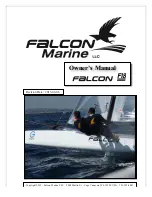
Responsibility of the coxswain/skipper/owner/captain
5
2. Responsibility of the coxswain/skipper/owner/captain
The owner or boat captain is fully responsible and shall adhere to the following principal rules:
1. Know and get to know about the limitations of your boat.
2. Always follow the rules of the road - make sure you know about the local rules and regulations.
3.
Keep a good and sharp lookout for people and objects in the water.
4. Ensure, that the anticipated wind and sea conditions do always correspond to the design category of the boat and
that you and your crew are able to handle the boat in these conditions;
5. Make sure your Crew and passengers are always safe, always keep an eye on them.
6.
Never sail or drive the boat when the operator is under the influence of drugs or alcohol.
7. Ensure that all crew receive suitable training, particularly with regards to the location and operation of safety
equipment such as life vests, life-rafts and distress signals.
8. Reduce your speed when there is restricted visibility, rough water, people in the water - boats, or structures nearby.
9.
Do never overestimate your own abilities and fitness. It is wise and sensible to consult other skippers, local au
-
thorities or government departments about specific information.
10.
Train with your crew and all people on board regarding the important maneuvers at sea: Above all the MOB - Man
over board. Each and every person on board should be able to execute this maneuver autonomously - even the
most experienced boat-captain may be the one in the water to be rescued.
11.
Have the craft inspected by qualified personnel at regular intervals and whenever a cause for concern is raised
have it repaired by qualified personnel.
12. Ensure compliance with all legislation in place in the area of operation. These may include requirements for the
carriage of life saving equipment, licensing of the helmsman and respect for the environment.
13. Check the bilge water level, liquids such as water, sloshing in the boat do reduce the stability of the boat.
14.
Regardless of the craft‘s seaworthiness and its certified design category, protection from freak sea and wind
conditions cannot be guaranteed. Beware of offshore winds and currents. The ability, experience and fitness of
the crew should therefore be taken into consideration before you head off.
15.
This craft may only be used by individuals fulfilling the regulations for the operator and/or license requirements in
the country of use. In many countries it is compulsory to carry a license or comply with other legislation in place in
the area of operation. Keep yourself therefore informed and up to date on the local requirements before you head off.
Preparation
Prepare any trip carefully, howsoever short, harmless or insignificant it may seem, be aware that:
Weather conditions may change abruptly and accidents onboard ship may also occur without any adverse influences
of a seaway or meteorological effects.
If you are prepared and equipped for an emergency then usually bad luck does not hit you. In
order to be prepared your boat should be equipped with appropriate gear and resources.






































